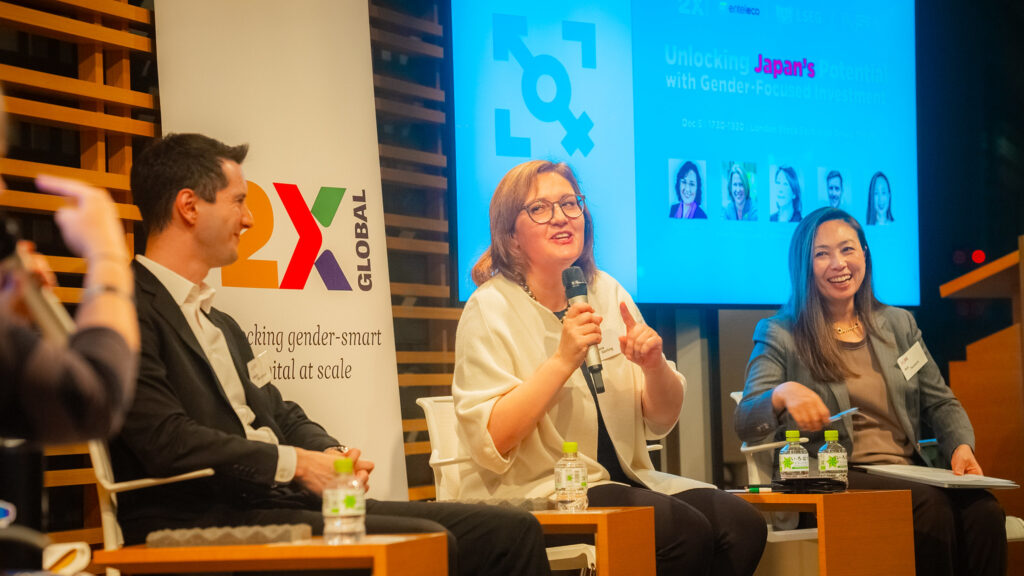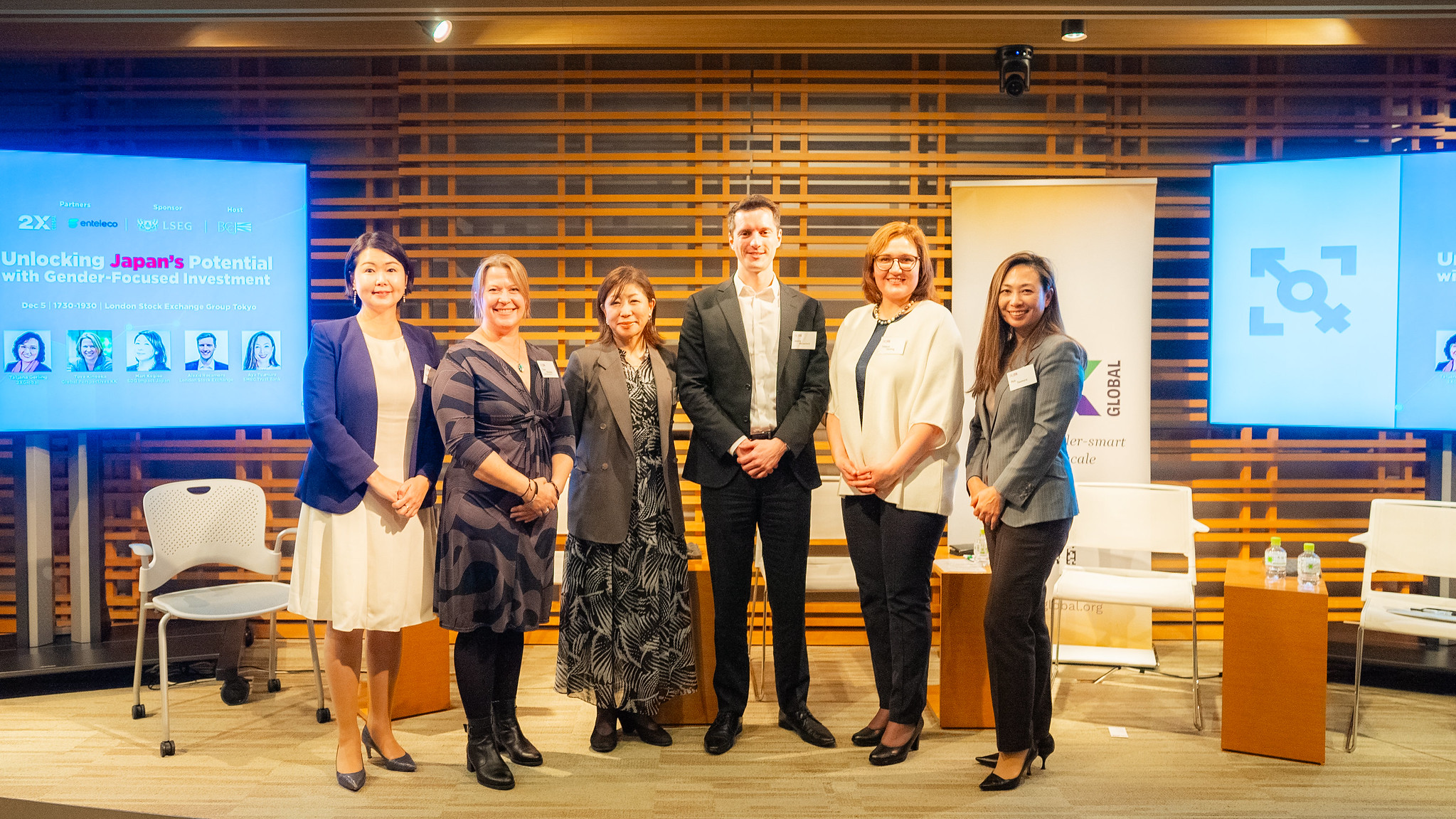Member? Please login
Unlocking Japan’s Potential with Gender-focused Investment

Written by Sterling Content
December 20, 2024
Past Event Round Ups
With businesses increasingly expected to incorporate social impact into their strategies, gender equity and sustainable investment within the financial sector is more relevant than ever for members of the British Chamber of Commerce in Japan (BBCJ) who are navigating the intersection of profitability and responsibility.
Exploring these themes, the BCCJ hosted a panel discussion sponsored by London Stock Exchange Group (LSEG) and held in partnership with 2X Global, a global organisation focused on gender-lens investing, and Enteleco, the sustainability arm of strategy implementation consultancy Global Perspectives KK. The event featured a range of leading speakers on sustainability, comprising:
- Tove Kinooka, director and co-founder of Global Perspectives KK & Enteleco, who also served as moderator;
- Mari Kogiso, representative director and co-CEO of SDG Impact Japan;
- Alexis Rocamora, APAC sustainable finance & investment lead at LSEG;
- Tatjana Gerling, ambassador to Japan for 2X Global; and
- Aya Tsumura, executive officer at SMBC Trust Bank, and chair of J-Win Executive Network
Gender equality efforts
The latest Global Gender Gap Index, which measures gender equality across economic, political, education and health-based criteria, makes grim reading for Japan. Asia’s second-largest economy placed 118th among 146 countries surveyed by the World Economic Forum in 2024, up from the previous year’s ranking of 125th but still the lowest among the Group of Seven nations.
However, as noted by Global Perspectives’ Kinooka, Japan’s position has been falling since the survey commenced in 2006, “not because the situation has got worse, but because there hasn’t been much progress.”
SDG Impact’s Kogiso said Japanese companies are willing to engage on gender indicators, but “they are having a really hard time improving these numbers because of the lack of a pipeline or strong gender roles.”
This is despite research by Japan’s Government Pension Investment Fund (GPIF), which found that the gender diversity funds run by MSCI and Morningstar “were among the best performers.” In 2023, the GPIF allocated US$3.7 billion to track the “Morningstar Japan ex-REIT Gender Diversity Tilt” index, showing its commitment to fostering gender diversity.
LSEG’s Rocamora noted women hold 42% of board seats in the FTSE 250 index, up from 12.5% in 2011. In Japan the comparable figure is only 8.4%, although the ratio has doubled since the 1990s.
“Now you ask me if investors care? Every year we run an asset owners survey looking at sustainability topics, and this is the first year that gender came in the top three of all these topics, alongside such issues as climate change,” he said.
“Another interesting finding is that 80% of the around 300 asset owners we interviewed said they are integrating gender issues into their investment strategies … but only 43% actually engage with companies on that information,” he added.

Driving change
2XGlobal’s Gerling said her organisation’s network of over 150 capital providers and industry leaders is working to ensure “clear actions on gender equality and investing,” using gender KPIs, that contribute to business efficiency and business success.
One of 2X Global’s flagship initiatives, the 2X Challenge, is a movement launched at the G7 Summit in Canada in 2018 to collectively mobilise US$3 billion in investments in developing country markets. This played a critical role in building the field of gender lens investing, mobilising US$4 billion to advance gender equality and women’s economic empowerment from 2018 to 2023.
The third edition of the 2X Challenge was announced at the G7 Leaders’ Summit 2024 with a commitment to invest at least US$20 billion over the next three years (2024–2027). Both public and private actors are now welcome to join the 2X Challenge.
Gerling gave examples of how gender KPIs can be integrated into the business model, for instance, a car manufacturer reviewing its supply chain regarding suppliers’ actions on gender-based violence and gender equality, or a business creating products and services benefitting women.
“It’s not only about risk, it’s about the opportunities for you as a business and also for financial institutions. Don’t only look at how many women you have on your board, but also how you make your investments. At least 30% of your portfolio should have a gender lens in the decision-making process,” she said.
SMBC Trust’s Tsumura pointed to the “unfortunate” situation in Japan regarding gender equality. Despite progress in the number of female directors and executives, she argued there had been some push back on diversity, with critics describing it as “reverse discrimination,” in addition to resistance to change from some companies with a traditional corporate culture.
“We need to visualise what the bottlenecks are,” she said. “Organisations need to go beyond the minimum requirement. It’s not just about ticking boxes, organisations need to take groundbreaking approaches to change the situation.”
Kogiso described an “age-centric” culture in start-ups, together with endemic sexual harassment, quoting a survey that found up to 80% of women in the start-up sector had experienced sexual harassment.
Rocamora said ultimately change would require a critical turning point or “crisis moment” akin to a revolution.
“Sometimes we want to make a change because it’s the right thing to do … it should be the responsibility of people advocating for the status quo to prove that the status quo actually brings more benefit than the change,” he said.
Tsumura highlighted the importance of external pressures as a catalyst for driving change in Japan—activities such as mergers and acquisitions with overseas businesses.
“While maintaining competitiveness within the domestic market remains essential, I would like to see more organisations integrate elements of overseas corporate culture into their operations, so this approach would enable the inclusion of diverse talent, fostering a more innovative workplace environment,” she said.
She also noted that “if you talk about men and women only, that creates conflict in society, but if we talk about a broader sense of diversity, people are more willing to engage in our stories.”








